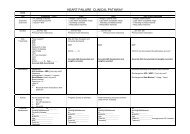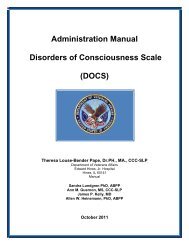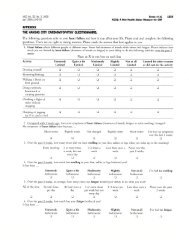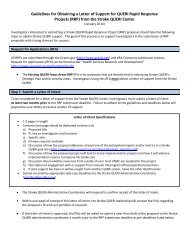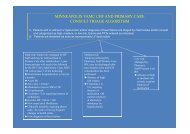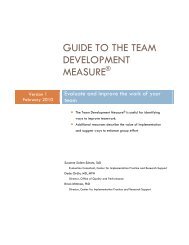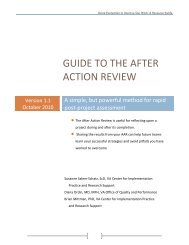The Veteran Supported Education Service Treatment Manual: VetSEd
The Veteran Supported Education Service Treatment Manual: VetSEd
The Veteran Supported Education Service Treatment Manual: VetSEd
You also want an ePaper? Increase the reach of your titles
YUMPU automatically turns print PDFs into web optimized ePapers that Google loves.
C. Coping Strategies in an <strong>Education</strong>al Setting<br />
Peer <strong>VetSEd</strong> providers can help <strong>Veteran</strong>s keep their education goal by promoting coping<br />
skills. As <strong>VetSEd</strong> providers likely know from their own lived experiences, the skills that<br />
each <strong>Veteran</strong> utilizes will depend on the particular difficulties they are having. For<br />
example, for a <strong>Veteran</strong> having difficulty coping or performing under pressure, it may be<br />
helpful to use time management strategies to avoid having to finish things at the last<br />
minute. It may also be helpful to learn stress management techniques like mindfulness,<br />
deep breathing, or other similar strategies. While the strategies noted below are useful to<br />
share with <strong>Veteran</strong>s, a peer <strong>VetSEd</strong> provider should supplement this information with<br />
examples from their own lived experience and experience working with other <strong>Veteran</strong>s.<br />
By doing this, the peer <strong>VetSEd</strong> provider can bring this information to life and increase<br />
<strong>Veteran</strong>s‘ motivation to integrate these strategies into their day-to-day life.<br />
Stress Management for <strong>Education</strong> Settings<br />
Learning to manage stress is a crucial step for success in educational settings.<br />
Overwhelming stress can reduce ability to focus and learn new things. It is extremely<br />
important to recognize and deal with stress before it becomes overwhelming and causes<br />
educational problems. In order to deal with stress, it is helpful for the <strong>Veteran</strong> to<br />
recognize the causes of stress and the signs of stress. When stress is recognized and<br />
understood, techniques can be applied to reduce it. Below are some causes, signs, and<br />
coping strategies for stress.<br />
i. Causes of Stress<br />
<strong>The</strong>re are numerous causes of stress and below is a partial list of causes of stress related<br />
to education. For <strong>Veteran</strong>s with PTSD, clinical help may be needed to cope with triggers<br />
and consequences of exposure to traumatic experiences. Please see the chapter VI. D.<br />
Knowing Your Population: Serving Returning <strong>Veteran</strong>s with Trauma and Post-Traumatic<br />
Stress Disorder (PTSD), Traumatic Brain Injury (TBI), Co-occurring Mental Illness and<br />
Substance Use for guidance in this instance. For other <strong>Veteran</strong>s, you can ask the <strong>Veteran</strong><br />
to apply the list below to his/her educational life and identify if these issues are adding<br />
stress to the pursuit of educational goals.<br />
Limited or no quiet/rest or personal time<br />
Worry and anxiety about educational failures.<br />
Difficulties dealing with mental health symptoms on campus<br />
65 | P a g e



